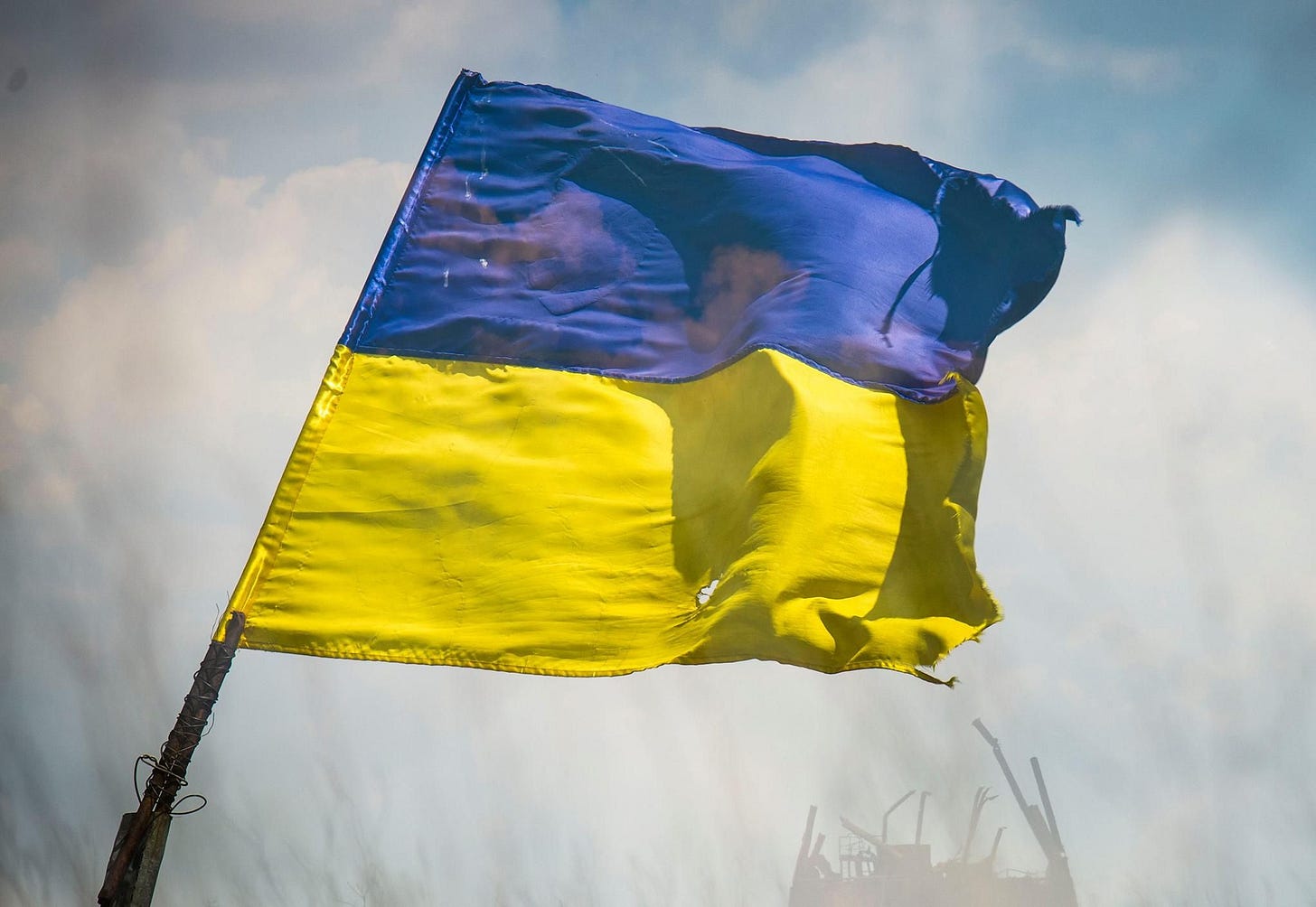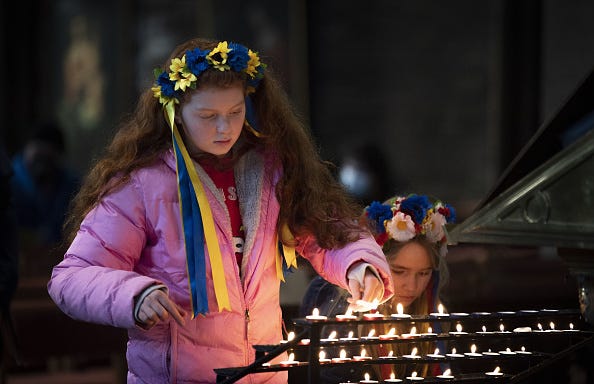As you may have noticed, I haven’t posted anything since last Sunday. My day job consumed me this week, as well as another writing project. I fully intend to get back to my regular schedule next week, starting with a series of posts about a new documentary about Abraham Lincoln and the Civil War that was released on AppleTV last weekend. Keep an eye out.
And then, like many of you, my mind became transfixed by Russia’s invasion of Ukraine. Somehow it felt wrong to post about movies and books and other cultural pleasures today. We need those outlets to endure the horrors of life, for sure. But just for today, we might do well to pause in prayer and stand in solidarity with Ukraine.
During this crisis, I have relied most of all on Prof. Timothy Snyder of Yale to offer context and analysis. Snyder’s an expert on Eastern Europe, especially Ukraine. He authored the 2012 book Bloodlands: Europe Between Hitler and Stalin, which reoriented our sense of the center of World War II. He also penned a pamphlet in 2017, On Tyranny, in the wake of Trump’s election that became an instant classic. He followed that up with a longer look at Putin’s campaign to destabilize the West entitled The Road to Unfreedom.
You can find many more resources of his on his Twitter feed. Here is how he summed up what’s happened:
For deeper analysis, check out his recent articles and interviews. These include:
“Ivan Ilyin, Putin’s Philosopher of Russian Fascism,” The New York Review of Books, 2018.
“Putin’s case for invading Ukraine rests on phony grievances and ancient myths,” The Washington Post, January 28th, 2022.
“Russia’s Intentions in Ukraine—and America,” Podcast interview, The New Yorker, January 31, 2022.
“The Russia-Ukraine crisis and how Ukrainians are finding a new sense of national identity,” Radio interview, On Point, February 8th, 2022.
“Vladimir Putin’s Hall of Mirrors,” The Atlantic, February 21st, 2022.
“Putin’s denial of Ukrainian statehood carries dark historical echoes,” The Financial Times, February 24th, 2022.
“Putin’s Hitler-like tricks and tactics in Ukraine,” The Boston Globe, February 24th, 2022.
“The Real and Imagined History of Ukraine,” Podcast interview, Today, Explained, Vox, February 25th, 2022.
“Putin’s rationale for Ukraine invasion gets the history wrong,” The Washington Post, February 25th, 2022.
Snyder also has a Substack of his own, Thinking about…, with many posts on Ukraine. For a brief history of the nation, check out this post.
His recent posts include links to organizations you can support to help Ukrainians:
NGO that arranges life-saving equipment for Ukrainian soldiers: https://savelife.in.ua/en/donate
Hospitallers working at the frontline: https://www.facebook.com/hospitallers/posts/2953630548255167
Ukrainian Women’s Veteran Movement: https://www.uwvm.org.ua/?page_id=3437&lang=en
NGO that assists internal refugees: https://unitedhelpukraine.org/
NGO that assistants internal refugees, especially from Crimea: https://www.peaceinsight.org/en/organisations/crimea-sos/?location=ukraine&theme
NGO that aids traumatised children: https://voices.org.ua/en/
Foundation that assists healthcare and education in eastern Ukraine: https://razomforukraine.org/projects/zhadan/
Libereco Partnership for Human Rights, evacuation and medical assistance
https://www.lphr.org/en/humanitaere-soforthilfe-fuer-die-ukraine/
Caritas, humanitarian assistance
https://www.caritas.org/ukraine-appeal-22/
Malteser International, evacuation assistance. (Make sure you have selected "Ukraine")
https://www.malteser-international.org/en/donation.html?amount=100&interval=0&fb_item_id=24633
Crowdsourcing of the Ukrainian army:
https://armysos.com.ua/en/help-the-army
To fund protective and other defensive gear for the Ukrainian army, go to
https://savelife.in.ua/en/donate/
I am not a professional historian. My knowledge is self-taught. And though I feel confident in my grasp of the United States of America, I am far from an expert on Europe. I’m not a diplomat or schooled in statecraft, intelligence, or international affairs. This makes me hesitant to offer analysis or recommendations. Moreover, I’m a Christian and a socialist, both of which mitigate against endorsing the use of force.
I used to think until quite recently that America should give up its superpower status and accept the reality of a global order where different regional powers exert influence in their particular sphere—the classic balance of power we learned in school. I looked on the calls for a new Cold War between us and China and Russia with skepticism.
But it’s become clear now that Putin is an imperial fascist who seeks more than just regional power or even the destruction of Ukraine. His ambitions amount to the undoing of the United States and Western liberal republics entirely. With this invasion, he has undone the postwar order and threatened the use of nuclear weapons.
My generation learned a valuable lesson from Iraq and Afghanistan. There are strong arguments to be made about the dangers of intervention and the unintended consequences of noble motives. Would aiding Ukraine lead us into another quagmire? Maybe. But this situation is not quite the same as Vietnam or Iraq, it seems to me—and I never thought I’d say that. It does feel, as Snyder puts it, closer to Poland in 1939.
Yes, it’s hypocritical for the United States to oppose imperialism by others. Yet as Snyder puts it, that’s the argument that Russia wants us to succumb to: everyone’s bad, so there are no rules. We must oppose this thinking. We can denounce American coups and illegal wars while also using its power to stop such wars by others. This is the dilemma for socialists: for all the evils of the American empire (and there are many) the likely successors to our power—China, Russia—are even worse.
During the Spanish Civil War and World War II, socialists and Christians set aside their anti-war views and attacks on capitalist empires in order to make common cause against an existential threat. While I had downplayed the danger from Russia until now, this has been a wake up call. It may be time for the Left to rethink its position on military confrontation with this aggressor. While we work for a better, egalitarian society, we have to also fight for the freedoms we have against an even worse world order.
I’m still thinking it through, but that’s where I am this morning. I’ve gone back and forth between just war theory and pacifism for much of my adult life, leaning mostly towards the latter. But this scenario challenges that calculus, and I find myself contemplating the case for just war against the Putin regime. The reality of nuclear weapons makes it all that much more apocalyptic. So if nothing else, pray.









Thank you for all the resources. I didn’t realize all that Timothy Snyder had written. His book On Tyranny Twenty lessons from the 20th century is very good and a quick read.